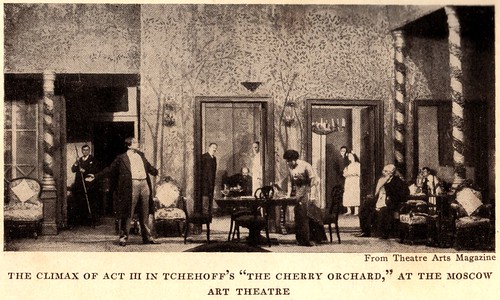Taishō Cherry Orchard
Having fallen in with a bad crowd, I am reading a 1923 edition of Вишнёвый сад (The Cherry Orchard), with translation by Jenny Covan and romanization by the Council for Period Detail: Tchekhoff, Liuboff, Firce. It's so old that the "Passer-by" (Прохожий) of Act II is "A Tramp". It's so old that the introduction (by editor Oliver M. Sayler) ends like this:
Nor is it remarkable that the Moscow Art Theatre holds "The Cherry Orchard" almost as holy ground. With this play it bade goodbye to a fellow-craftsman with whom its destiny was strangely intertwined. Its various rôles have been guarded jealously by the actors who first embodied them. And so to-day [!] nearly two decades after, Stanislavsky still plays Gaieff; Mme. Knipper, the playwright's widow, Mme. Ranevskaya; Leonidiff, Lopakhin; Moskvin, the blundering clerk Yepikhodoff; Gribunin, the garrulous landowner Semyonoff-Pishchik; and Alexandroff, the footman Yasha.
(I think that's the right Gribunin... but who was Alexandroff?)
I wasn't sure whether to blame the awkwardness of Yasha calling Dunyasha a "small cucumber" instead of a "little cucumber" on the age of the translation, but then I found another translation of a Russian work which seems to date from 1898 and which does it the expected way:
'O my lieutenant!
My little cucumber!
My little love!
Dance with me, my little dove!'
Best of all, it has margin notes in the old orthography!

インド人の用ふる香料, "Perfume used by Indians", but written using 用ふる mochifuru, attributive form of mochifu ( = modern mochiiru, "use").
Elsewhere, "frivolous" is glossed as fuwafuwa [shita], spelt ふはふは (fuhafuha). Heron is 蒼鷺, with the furigana awosagi. Intellectually you know that people used to write this way—that it was the standard spelling of Japanese—but it's a thrill to see it scrawled in the margin.
And there are some vocabulary differences too. "Cockroach" is glossed as aburamushi, but nowadays most people would say gokiburi (or maybe that's just a Tokyo thing?). "Between you and me and the gatepost" is koko-kiri no hanashi, an extinct ancestor of koko dake no hanashi ("a conversation only for here [not to be repeated elsewhere]").
Also, the Moscow Art Theatre really knew how to stage a play. Check out this photograph of Act III:
It's like a clown car in there.
![[No-sword]](http://no-sword.jp/images/site/no-sword_banner.jpg)




Peter Maydell:
>most people would say gokuburi
Typo for gokiburi, or actually a Tokyo thing?